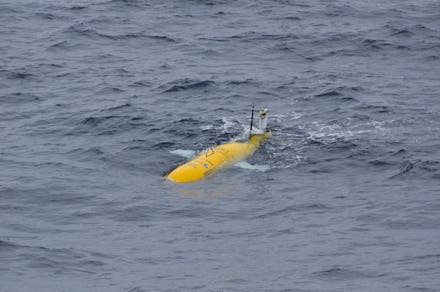Boaty McBoatface made a huge climate change discovery on its very first voyage

Boaty McBoatface is more than just a silly name for a boat — it's a research submarine that is playing a big part in mapping the effects of climate change on deep ocean water. During its very first mission in 2017, referred to as a 'maiden outing,' Boaty McBoatface made a climate change discovery from information gathered in the Southern Ocean that is helping researchers understand how the water is warming from the rising global temperatures. The revealed that an increase in Antarctic winds, caused by greenhouse gasses, are mixing warmer ocean waters with the cold water along the Arctic seabed, raising the overall ocean temperature.
More formally known as an autonomous underwater vehicle — a type of remote-controlled robot that can travel underwater without requiring a human onboard — the sub spent three days in a polar ridge near the Antarctic Peninsula to retrieve data from the area. It recorded the ocean's currents, temperature, salinity, and turbulence as it navigated underwater valleys at depths up to 4000 meters.
Its findings revealed that an increase in greenhouse gasses and a hole in the ozone layer above Antarctica have produced strong winds that travel over the Southern Ocean. These winds stir up warm, mid-level ocean waters that mix with the colder, deeper waters of the abyss. The cold waters then become warmer along the sea bed, becoming a "significant contributor to rising sea levels." The warmer temperatures can melt land-based ice, such as glaciers, and cause the seawater to expand to higher levels. These higher levels are dangerous, according to the National Oceanic and Atmosphere Association, because it puts many coastal cities at risk of more extreme floods and powerful storm surges that travel further inland.
Boaty's data shows clearer evidence that winds changed by greenhouse gasses are affecting even the coldest parts of the ocean. Before the submarine's journey, there was limited data that to prove how the oceans were heating up. Now, researchers can link the winds and water turbulence together.
The lead scientist, Professor Alberto Naveira Garabato of the University of Southampton, explained to The Telegraph that this will help them "learn enough about these convoluted processes" to create more accurate climate change models "that scientists use to predict how our climate will evolve over the 21st century and beyond."
Furthermore, Boaty's journey isn't just a success for scientists; it's also an exciting example of using robots to help humans with climate change research.
In a statement to the University of Southampton, Dr. Povl Abrahamsen of the British Antarctic Survey said, "This study is a great example of how exciting new technology, such as the unmanned submarine 'Boaty McBoatface,' can be used along with ship-based measurements and cutting-edge ocean models to discover and explain previously unknown processes affecting heat transport within the ocean."
The name 'Boaty McBoatface' gained notoriety during a British marketing campaign to name a new research ship owned by the National Environmental Research Council (NERC). In 2016, the agency ran a public, online poll to receive suggestions and garner votes for various names. Taking advantage of the organization's naivety, and opting for typical internet humor, the public overwhelmingly voted for naming the glorious vessel 'Boaty McBoatface.' NERC felt the name was inappropriate and overruled the decision to name the vessel the 'RSS Sir David Attenborough' after the famous broadcaster and natural historian.
The public threw a fit over the change, causing a flurry on social media, so NERC made a compromise: Instead, 'Boaty McBoatface' would be the name of three new research submarines.
With this successful journey, these autonomous submarines are sure to continue playing a large part in deep ocean research. And, in the future, they'll be going back to where it all started — the subs will be operating from the RSS Sir David Attenborough when the research ship is operational later this year.